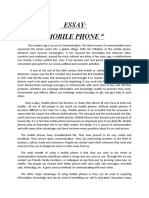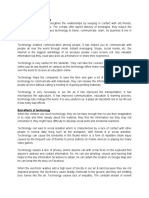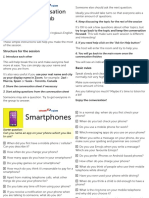0% found this document useful (0 votes)
208 views13 pagesIt Assignment Mobile and Technology.
1) While children now spend more total time at home with parents than in 2000, this additional time is spent alone, supporting the idea of "alone together" time increasing.
2) Families spend about the same overall time in shared activities like meals and leisure, though contemporary families spend less group TV time.
3) Mobile device use of around 90 minutes per day cuts across family time spent together and alone.
Uploaded by
Selwin GeorgeCopyright
© © All Rights Reserved
We take content rights seriously. If you suspect this is your content, claim it here.
Available Formats
Download as DOCX, PDF, TXT or read online on Scribd
0% found this document useful (0 votes)
208 views13 pagesIt Assignment Mobile and Technology.
1) While children now spend more total time at home with parents than in 2000, this additional time is spent alone, supporting the idea of "alone together" time increasing.
2) Families spend about the same overall time in shared activities like meals and leisure, though contemporary families spend less group TV time.
3) Mobile device use of around 90 minutes per day cuts across family time spent together and alone.
Uploaded by
Selwin GeorgeCopyright
© © All Rights Reserved
We take content rights seriously. If you suspect this is your content, claim it here.
Available Formats
Download as DOCX, PDF, TXT or read online on Scribd
/ 13




























































































